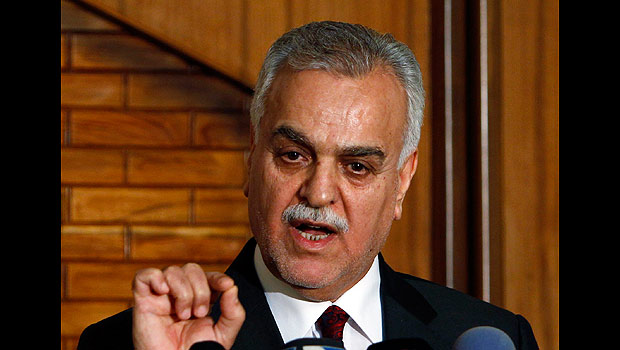Hashemi, a Sunni Muslim politician with the Iraqiya bloc, fled Baghdad in December when the Shiite-led government accused him of running death squads, a dispute that risked upsetting a delicate power-sharing agreement.
The vice president, who is in Istanbul, has denied he was involved in murdering six judges and other officials. He says the charges are politically motivated and has refused to stand trial in Baghdad.
“My defense lawyer will present an appeal to Interpol in the next few days,” Hashemi said in a statement. “I won’t submit to pressure and blackmail.”
The case strained Iraq’s fragile coalition of Shiite, Sunni and Kurdish political blocs and generated fears of a return to the broad sectarian violence that wracked the country during the darker days of the war in 2006-2007.
“This is an escalation ... while some Iraqi political blocs are trying to meet to solve problems, those which head the government are creating problems,” said Ahmed Al-Massari, a senior Iraqiya lawmaker.
The Hashemi case is being closely monitored by Iraq’s neighbors concerned about the turmoil spinning into more Sunni versus Shiite violence, just months after the last American troops left the country in December.
The Red Notice issued by the international police organization calls on security forces in its 190 member countries to help locate Al-Hashemi and bring him to justice.
“At the request of Iraqi authorities, Interpol has published a Red Notice for Vice-President Tareq Al-Hashemi on suspicion of guiding and financing terrorist attacks in the country,” Interpol said in a statement.
Turkish Prime Minister Tayyip Erdogan told a news conference in Rome while on a trip to Italy that he believed Hashemi would return to Iraq after medical treatment.
“Hashemi continues with his initiatives regarding his legal problems,” Erdogan said. “We gave him all kinds support on this issue and we will continue to do so.”
Interpol said the notice would restrict Hashemi’s ability to travel and cross borders.
Hashemi’s trial was postponed a week ago after his lawyers argued that it should be held in a special court for political figures. It is scheduled to resume on Thursday.
The trial focuses on the assassination of three government officials. Hashemi and his bodyguards are also charged with the murders of six judges.
Since December when Shiite Prime Minister Nuri Al-Maliki’s government accused Hashemi and sought the ouster of another leading Sunni politician, many Iraqi Sunnis say they fear he is trying to sideline them to consolidate his power.
The political crisis has been complicated since last month when the autonomous Kurdistan region halted oil exports and hinted it could break away from Baghdad in a long-running dispute over oil and land rights.
Four senior Iraqi political figures have threatened Maliki with a vote of no confidence unless he stops engaging in what they called “autocratic” decision-making at the expense of other partners in the power-sharing government.
But the Shiite, Sunni-backed and Kurdish blocs are still haggling over an agreement that will break their political impasse. Most blocs are sharply split over how to end the crisis and who might replace Maliki if his critics muster a vote against him.
----------










